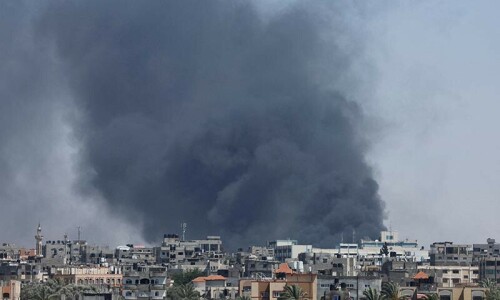The government pulled out all the stops for the two-day visit by President Recep Tayyip Erdogan to Pakistan. That is indeed as it should be.
With an increasingly bellicose geopolitical environment in the region, this country needs to sustain and deepen its ties with nations with whom it has traditionally enjoyed stable alliances.
To signal the importance that it placed on the potential for the Turkish president’s visit to enhance bilateral ties, the government invited him to address parliament. It was the third time that Mr Erdogan had done so, a record for a foreign dignitary.
However, coming four months after the attempted military coup against him, the Turkish head of state this time around was speaking from a very different perspective, and it was evident in his words to the Pakistani legislators.
Mr Erdogan denounced what the Turkish government refers to as ‘Feto’— the organisation led by US-based cleric Fethullah Gulen, the alleged instigator of the failed coup — as a terrorist outfit comparable to Al Qaeda and the militant Islamic State group, and expressed his appreciation of Pakistan’s decision to expel the Turkish staff of the Pak-Turk schools — allegedly run by Gulen-linked elements — on the eve of his visit.
While Mr Erdogan may have his reasons for branding his political opponents as terrorists, it is problematic that he expects Pakistan to fight his battle with them on its turf. It is even more problematic that the government has obliged him with alacrity at the cost of thousands of Pakistani schoolchildren’s educational future.
The abortive coup against his government last July met with strong and justifiable condemnation from the media in this country, the same media that our esteemed guest criticised for not being unstintingly on board with the expulsion of the Pak-Turk school staff.
Mr Erdogan’s crackdown in his country against not only those suspected of being directly involved in the coup attempt but also against tens of thousands of teachers, judges and journalists perceived as Mr Gulen’s supporters is evidence of Turkey’s disturbing drift away from democratic traditions towards autocracy.
Meanwhile, our government must remember that Pakistan’s relations with Turkey are broadly with the state of Turkey; not with the present dispensation alone. It should refrain from actions that may require radical course correction under another Turkish government.
Measures such as the recently announced expulsions inhibit people-to-people contacts, the only constant in relations with any nation.
Published in Dawn November 19th, 2016












































